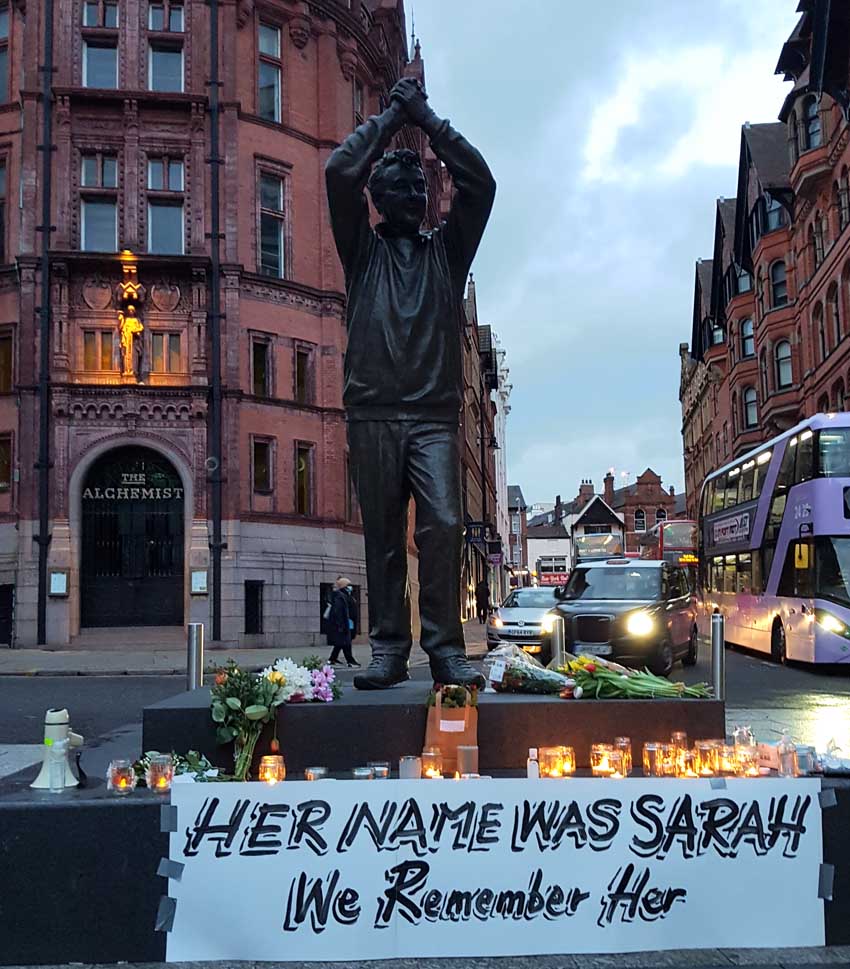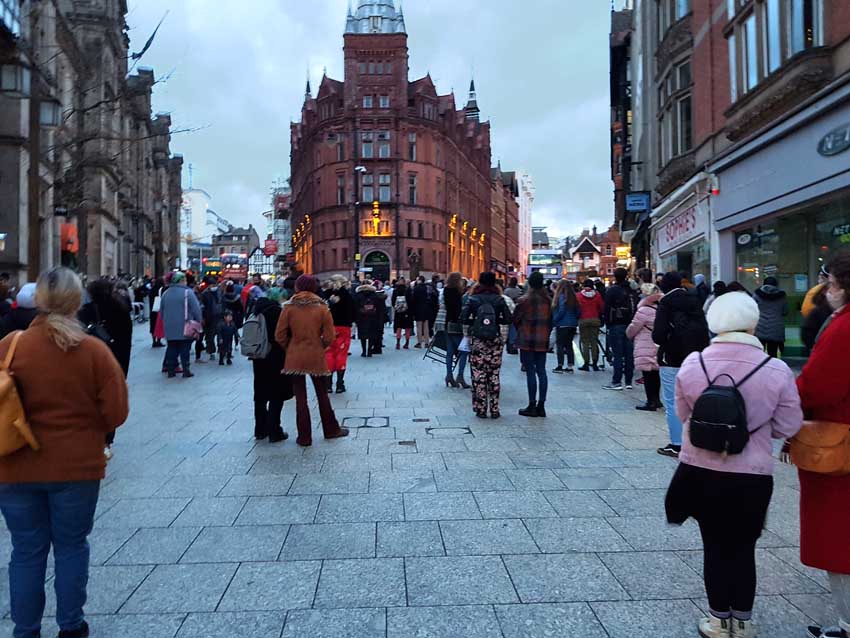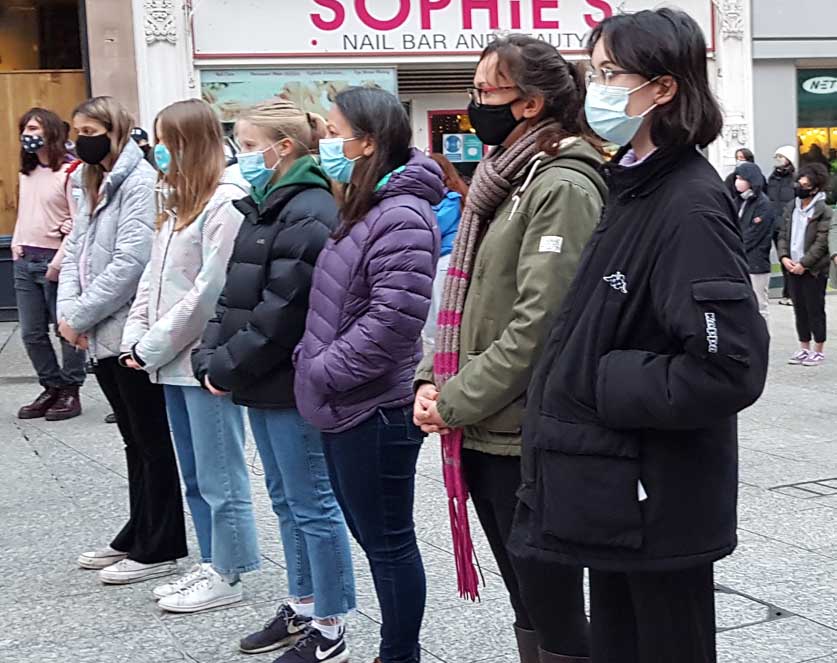The speaker, a few metres from where I stood, began by telling us she was “sick of men” telling her this, and “sick of men” telling her that. What she lacked in oratory skills she sought to make up for by working herself into a righteous fury. It lasted fifteen minutes and though I hate to say this – I’d come in all respect – it sounded a little phony to me.
I tried to imagine what I’d be feeling, right there and then, had Sarah Everard been my daughter. I gave up – too big an ask – but was sure I wouldn’t have wanted to listen to this.
To be fair, it’s not always easy to tell fake from genuine emotion. In my experience the real deal can at times look and feel like a second rate B-movie. And if ever there was a time and place for applying benefit of doubt, this was it. Still, while I don’t claim super powers of insight or radical objectivity here, to my ears a false note was being struck. It spoke to me of someone getting off on her own incandescence, and lacking the self awareness to realise it.
It would have bothered me less if she’d been saying anything of practical value. She wasn’t, and I had the depressing thought that none of the men she was sick of would have come within five miles of where we stood in the cold and damp.
(My estimate – head-counting two clusters, factoring in social distancing and extrapolating – put the assembly at 130-150: mostly women but with a good few men and, here and there, a small child. In hi-viz jackets but otherwise low profile, two WPCs patrolled sedately; the only overt police presence. Nottinghamshire was one of the few forces to allow, when coronavirus legislation empowers them to ban, the vigil/protests planned across Britain.1 )
Late that afternoon it had become clear that Notts Constabulary would take this position, but I was set on coming regardless, figuring that many would defy any ban to pay homage to and/or protest at another young woman murdered.
By a man who in all likelihood had never set eyes on her prior to the evening of March 3, when Sarah was last seen alive.
The day before I’d read tweet after tweet, post after FB post, from women – some angry, some just disheartened – but many men also. Most were adamant: men need to Start Talking About our attitudes to women. But here too I was experiencing the most dismal deja vu. What was it Einstein said?
Insanity is doing the same thing over and over and expecting different results.
The speaker wound up, to enthusiastic applause. My hands stayed in my pockets. I hated being a piss-vinegar, and a male one at that. But though this woman was young enough to have been my daughter, she’d said nothing I hadn’t heard forty-five years ago.2 Had the applause been on the feeble side I’d have slapped palm on cold but face-saving palm. As it was, I saw no need to endorse a message whose tone and content had left me wondering why I’d come.
We all stood around for several minutes. A few women lit candles at the feet of Brian Clough. I turned to walk down Old Market Square. At the tail of the gathering, two parties stood in semi-detached observation. One was a duo distributing fliers for the Socialist Party, formerly known as Militant Tendency. I asked the elder, a woman in her fifties, if her outfit had wanted to speak. Sure, she replied. ‘But the organisers didn’t want …’ – she curled two fingers on each upheld hand to describe air quotes – ‘… political messages …’
The other party was a cluster of Deliveroo riders, men and women in their twenties and thirties. (Old Market Square is where they gather for news of the next job.) My butterfly mind fluttered from riders to casualisation at large, and from casualisation at large to the fact that over the last few years my two stepdaughters – more than a decade younger than my two daughters – have done stints at Wetherspoons. Many a time they’d work into the early hours on shifts with no set end-time. The pub manager decides, on the basis of diminished clientele, when it’s time to call it a night. Then the mainly zero hour staff may leave.
‘And what measures’, I’d once asked, ‘do Wetherspoons take to get you safely home?’ My elder stepdaughter, just turned eighteen, looked at me with the fond indulgence you might bring to bear on a well meaning simpleton. I may as well have been asking if Tim Martin showed up in person to chauffeur each and every one of them to their doorsteps.
*
Believe it or not, this post is not the one I wanted to be writing this morning. I didn’t go to Old Market Square with cynical intent, and would much rather be writing something upbeat. As it is, putting things to right on the wider realities the Wetherspoons and Deliveroo models point us to, while it would not have saved Sarah, seems to me a more practical approach – to shifting a cultural landscape in which all of us are diminished and brutalised, and for which women will pay, because they always do, the heavier price – than any I’ve heard touted these past few days.
*
Update some hours later. The above was written before I’d caught up with events elsewhere. Had I been in South London I’d have had a very different experience last night, and written a very different post. Meanwhile on Clapham Common …
* * *
- Further update a few days on. My claim that most constabularies had banned vigils-protests for Sarah was based on what media seemed to be saying that afternoon. I now know a vigil was held in Sheffield and it seems likely there were others, all lightly policed save that at Clapham Common.
- 45 years ago, recall, Peter Sutcliffe, aka the Yorkshire Ripper, was terrorising the north of England.





To be fair, Phil, I empathise with the woman who was “sick of men telling her x, y and z”. I’ve caught myself out on ‘mansplaining’ a few times, and that’s just from me – the women on the other side of things might make it more than a few times. What it’s like from men who are not sympathetic to women’s issues is beyond my imagining. Also, a common reaction to women’s protests is to adopt a defensive and counter-accusatory stance. I don’t think that is helpful. While we (men) don’t need to accept everything we are accused of as gospel, we have to examine every accusation dispassionately and accept the blame where it is justified.
I don’t suppose though that that will be any kind of real answer. Again I think that psychology must take precedence over sociology – this sort of thing has been going on since the advent of recorded history. It would be interesting to know what the few matriarchal societies we have some information on were really like.
It would be good to think that the solution will be similar to that of wearing seat belts or smoking in public – social disapproval for perpetrators. But violence towards women has not often been a completely socially acceptable practice, and it still goes on. Perhaps it will reach the same standing as slavery – but then slavery still goes on in a disguised fashion too. Parthenogenesis – that’s the answer 🙂 But don’t broadcast it!
Yes Jams. But also to be fair, I was there. I could have recorded the speech on my phone, I guess, but tbh that wouldn’t have felt right. As for not being defensive, yes again. But I spent years believing all I was told before the penny dropped that being oppressed – or for that matter exploited – doesn’t confer infallibility. Nor does it confer the right of some to speak for the many. It’s not like I’m coming at this for the first time.
You’re right to follow the seat belt/smoking analogies with a “but”. Patriarchy is inseparable from class society. Is that mansplaining? I can see the term has validity but I’ve too often, in the few years it’s been in circulation, encountered it in a reactionary, conversation stopping context. In that respect it’s functioned in much the same way as “conspiracy theorist” and “whataboutery”.
In fact I was giving a shorthand. “Men telling me” was a small fraction of the things she was sick of.
Two questions about the above piece:
The speaker in this account says nothing that Phil hadn’t already heard 45 years ago: Why might that be? What might it tell us about the situation for women today?
The speaker said nothing of practical value: Where/with whom might the responsibility for providing practical solutions lie?
BTW see the 8 practical solutions proposed yesterday by former Director of Public Prosecutions for the North-West, the wonderful Nazir Afzal – some of which were first proposed by women at the time of the Peter Sutcliffe murders – around 45 years ago.
That the situation has not improved. Therefore repeating the demand that “men” Start Talking About “our attitudes to women” is unlikely to work. Least of all when hurled in vituperative tones at the tiny minority of men – in the case of last night in Nottingham, some 20% of the 130-150 who could be arsed to show up – actually listening.
That’s a tougher question. In my above reply to Jams I gave my view that patriarchy is inextricably linked to class society. I made the same claim, also in a reply to Jams, in the preceding post:
Finally I did sketch out one (hardly original) practical solution:
As I think you know Ros, I am in my ninth year of a hard and at times very lonely battle against casualisation by your employer and mine, Sheffield Hallam University. From the start I sought to place my treatment in a wider context. (To see precisely what I mean, try Part 3 of my posts on that struggle, its opening paragraphs comparing casualisation with sexism and racism in my own lived experience. I widen those same themes in the opening paragraphs of Part 4.)
I try to do the same with the casualisation, cited in this post, of my stepdaughters and their colleagues.
I also imply, again in the current post, another practical way forward – refraining from no-platforming class perspectives as “too political”. (I am critical of Militant/SP but this is no time for sectarianism.)
On a different note, my searches on Nazir Afzal proposals (past week) are drawing blanks. Can you provide a link?
I read this and thought it was the neatest summation of why sex is a class issue for me:
Oppression is both a function of class society and a product of it.
Women (as a group) perform reproductive labour for less than its material value; men (as a group) extract surplus value from that labour.
Women’s oppression is socially/politically constructed, and is the consequence of biological sex.
Sadly as a campaigner I feel exactly the same about the current state of affairs – the problems haven’t changed in the 30+ years I have been active. I believe they won’t improve until we have more women in decision making positions to ensure that policies and practices, which inevitably impact on the sexes differently, impact positively for women. This is the single biggest reason I wholeheartedly support positive action and AWS. Putting biological males who identify as female up on those platforms serves no purpose other than to ensure that male voices remain over represented and women oppressed.
I apologise if that sounds ‘ranty’ and similar to the ‘I’m sick of all men’ chant but when at least part of an answer is patently obvious and you’ve been pointing it out in a reasonable manner for years, you lose the ability to not go into attack/defensive mode immediately – even when preaching to the converted!
This doesn’t sound at all ranty. (Btw – and you needn’t answer of course – are you male or female?) Some of what you say I agree with entirely, in particular this:
On other aspects I’d need to know more of your reasoning. I’m open to arguments on AWS but suspect the greater nuance of spoken dialogue is needed to tease out where we may/may not agree. For instance the issue of surplus value extraction is huge. My rough and ready view, badly in need of updating, is that capitalism’s exploitation of women’s labour is akin to its exploitation of nature. (John Smith’s brilliant empirical and theoretical study, Imperialism in the twenty-first century, reviewed on this site, looks into some aspects of this in the global south: in particular (a) the ‘feminising’, disastrous for male and female workers both, of labour forces trapped and super exploited in the sweatshops of China and Bangladesh; and (b) Asian feudal traditions – Confucianesque ‘family values’ – relieving state and employer of welfare overheads, to the ultimate gain of capital in the global north.)
Marx’s stupendous work does not adequately address the issue of women’s value – if anything likening it more to the surplus value extraction of slavery than of capitalism – but, the last time I was following this (late eighties!) attempts to synthesise marxist and feminist takes on exploitation (as distinct from oppression) had descended into a mire of postmodernism via Lacan and Derrida. I dare say I’m hopelessly out of date.
As for the statement:
It carries an implied corollary: that things will improve given that eventuality. I’m not sure but again a more nuanced discussion may be needed. I can’t for instance tell from this whether you think having women in high office – Cressida Dick, Hillary Clinton, Priti Patel, Victoria Nuland, Nicky Haley etc etc – is ipso facto a good thing. I don’t – see this splendid short video for the why of that. On the other hand you may not be saying that at all. Again, there’s a lot of nuance to tease out here.
I agree with you unreservedly on ‘males identifying as females’. They are entitled to do so. What they are not entitled to do is share spaces – women’s changing rooms, jails, refuges, competitive sports or all women shortlists (an issue separable in principle from that of whether AWS are a Good Thing) – reserved for biological females. See this post from a month ago.
Thanks for contributing, Terry. Do feel free to say more.
Well you couldn’t make this up! I just learned we have a mutual friend, Dave Hansell, who tells me not only that you sent him that linked video clip, but also forwarded the Esther Giles piece.
Small worldette!
Well, this is a tricky reply so I have left it a time to collect my thoughts, as they are!
Firstly and most easily, I am female, but my name has always been spelled the way a male would spell it. Interestingly this has actually worked in my favour on occasions and I’ve lost count of how many times I have been asked/invited to something only to have been met with “oh we were expecting a man!” usually in a way which signifies a disappointment in actually meeting a female. (No, I don’t think I am being sensitive there – at least not in every case!)
I am afraid it’s the next ‘chunk’ that stumps me. I have degrees in Chemistry as well as Medical Sciences, but my political knowledge is totally limited to my experiences. I am about to launch into some huge generalisations now – I feel as though this is not an uncommon position for women, which set me thinking: Politics is exclusionary and often uses language to further that in my view, lefty men being frequent perpetrators of the old language putdown! Women often already feel that politics is a male subject, when in actual fact, because policies usually impact on women in a less favourable way, they are the ones most affected by ‘bad’ politics. I wondered why I don’t understand many of the common terms you use on here and I think, as well as having a lack of time to get to grips with them, there is a feeling that understanding phrases such as social and political construction, surplus value etc will not actually change the experiences I have had as a biological female. The definition of sex as a class that I shared is the only one that I remotely understand. It syncs with my very real experiences of so many situations, places of learning and work, and really, just life in general. I’m sorry (and ashamed) to admit that I cannot enter into an in-depth discussion about Marxism, capitalism or even feminism -of any wave! I operate solely on gut feelings of fairness.
This in itself feels like an immensely risky confession, and I can almost feel the eye rolls as I type. But those eye rollers need to ask themselves why it is hard for a well-educated woman who has had significant experience (and success) in the field of politics, to actually say in public “I don’t understand politics”.
I was part of a small working group at the Treasury under Gordon Brown that set up the Sure Start programme. My input wasn’t based on theory, it was based on experience. I knew the women and families this was going to affect, I understood a lot of their experiences, but more importantly, I recognised that I didn’t understand ALL of their experiences. As a result, I really believe in locally led and accountable services, that are responsive to the needs of local people. I was entirely intimidated by the ‘clever people’ in the room but felt strongly enough about my constituents to stick my head up and ask questions, “but how is that relevant to X” or “do you think that if we did Y it might be easier for people to use?”. I feel that this was my contribution – pointing out that life isn’t a theoretical argument – and hope that it was an important part of the programme’s formatting.
With respect to women in positions of decision making, I fully accept your question. I would argue that the most influential politician for me was Thatcher – an undisputed baddy! I sit with my back to a poster showing the badges of all the pits she closed, I grew up to argument after argument about money, job insecurity and a crazy desire by working class parents to overstretch themselves in the housing market immediately before interest rates shot up to about 18% in the early 80s. My dad worked in the shipyards on the ships that were sent down to the Falklands with me screaming my CND and anti war protests in his ear while he supported the Sun front page of ‘Gotcha’ or whatever it was! My whole being is shaped by my idea of what is, or isn’t, fair. Equality for me is the natural extension and I’ve spent a lifetime fighting it.
Do I think all women are better at policy making for women than men? Of course not! Do I think that many of the women who reach those positions in this male dominated climate share the experiences of someone like me? No to that too. Do I think that women who ‘make it’ have taken on some male attributes required to have done so? Yes, especially in politics or the police. And I say that as someone involved in politics, who knows that unless my husband was happy to be downstairs right now making Sunday dinner for our lone parent daughter and grandson, I wouldn’t have the opportunity to write this. [He was a frontline police officer for 30 years (given the uncomplimentary nickname ‘the social worker’) and has been working as a probation officer for the last 5 years]
I do believe that each woman who gets somewhere might deliberately or inadvertently chip a corner off the block making a handhold for the next woman, or, be genuinely interested in listening to other women’s experiences with a degree of understanding that men cannot have. Men cannot understand the experiences of female biology and the effect it has on life no matter how much they may empathise or even identify into it! My own personal experiences of being told I wasn’t allowed to do Tech Drawing at 11 because I was a girl, despite desperately wanting to be an architect, of being sexually abused by a close relative for years, of being one of 2 girls on my Chemistry course at Uni, of all the medical and social stuff of having 3 kids, a family history of breast cancer, needing a radical hysterectomy….. God it goes on and on. Those experiences need reflecting in our policy making and I believe that, women (in general) will do that for other women, more appropriately than men (in general). Had more women been in lofty positions for any length of time then we wouldn’t have had the fiasco of the MOMA Act so recently for example.
I am really grateful for male allies in this fight. I do not ‘hate’ men and I don’t dismiss their experiences. I just believe they are different to women’s. The commonalities around class issues unite us and we need to fight together.
Ranty Mc Rantface aka Terry Barrow (f).
Wow! Truly eloquent comment Terry. I’m blown away you chose my site to say so much. I was out walking my dogs when it came in on my phone, and I could see at once it needed thinking time. I’m going to ask for a little more time for the fuller reply it merits, so please bear with me a while longer.
Forgive my preferring to address you as Terry than Ranty!
PS I was a sexually abused child too, in a children’s home. For all it gets talked about so much these days, I still feel it’s more common than people realise. FWIW, sex has been an amazing part of my adolescent and adult life but then, in my case, the abuse was mild. In fact for years I didn’t even recognise it as such but then, everybody thinks they know what abuse looks like when the truth is that few of us really do.